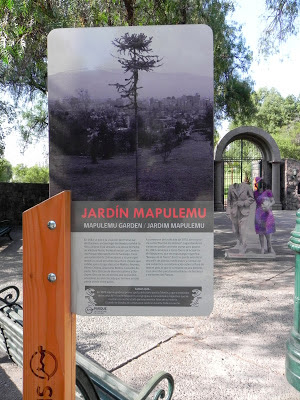 |
| Valparaíso |
Hello again.
I've been in Chile — Santiago, Pichelemu, Talca, Pelluhue, Casablanca, Curacaví, Viña del Mar, Valparaíso, Santiago — eating, drinking, taking pix, reading Shea/Wilson's The Illuminatus! Trilogy [fnord], & translating.
Astonishing to find so many people we know living in Santiago, a first-world city.
Read here @ jacket2 a thoughtful introduction to language poetry in a review of The Grand Piano.
| Murat Nemet-Nejat [pic courtesy of Nazim Hikmet Poetry Festival] |
The
frame of a Bresson movie is a jail
the escape is going outside that jail
it all starts with the noises one hears,
becoming one, knowing what the noises are.
that’s freedom.
the escape is going outside that jail
it all starts with the noises one hears,
becoming one, knowing what the noises are.
that’s freedom.
from
Murat Nemet-Nejat’s essay, “Questions of Accent”:
the
word Oklahoma? A wild, alien, distant sound . . . an intimate sound,
one of the rare words in English with vowel harmony . . . alien
ground in which [the] private soul can nest itself, the synthesis
between the powerful and the victim . . . What is the word Oklahoma
after all, but the imprint of the Native American, the victim, the
invaded in the language of the master. . . .
alienation,
instability between writer and language, a radical skepticism about
its ability to reveal inner truth constitute its essential nature.
The relation of the poet to the language is inescapably
confrontational. American English is the quintessential unnatural,
insufficient, weak language which the writer has to bend, distort, to
translate into, to interject his or her vision. To me, three
nineteenth century writers, none of them Jewish but white protestant,
embody this accented writing: Hawthorne, Melville and Dickinson. . .
. Dickinson invents a language which only pretends to be English and
must be read over and over again to be stripped into its message, a
violent sadomasochism. Words are private emblems, the syntax
unstable, constantly shifting, not quite an "English"
syntax, the smooth "hymnal" surface hiding, shafted with a
sadomasochistic violence. . . .
What
do sun, father, Hunter, He, God, etc. (all images of authority) mean
in [Emily Dickinson’s] work? Nothing. They are essentially blank
emblems, a chain of Moby Dicks, completely stripped of their
traditional associations, around which the poet weaves her barely
decipherable soul. Under the deceptive music of a hymn, of a little
embroidering lady, the blankness of these crucial images
liberates/unhinges the syntax in the poems, completely privatizes it.
When In Santiago, visit Jardín Mapulemu, Bosque de la Tierra, in Parque Metropolitano de Santiago, to learn about the plants that grow in Chile:




No comments:
Post a Comment